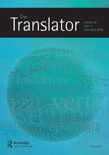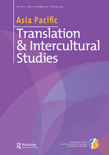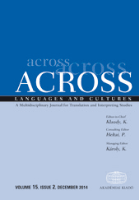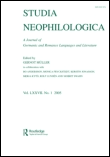
Translator
Scope & Guideline
Advancing Insights in Communication and Linguistics
Introduction
Aims and Scopes
- Interdisciplinary Approaches to Translation:
The journal emphasizes interdisciplinary methodologies, integrating perspectives from sociology, linguistics, literary studies, and communication studies to explore translation as a dynamic process. - Cultural and Political Dimensions of Translation:
Research often investigates how translation shapes and is shaped by cultural narratives and political ideologies, highlighting the role of translators as cultural mediators. - Audiovisual and Digital Translation:
A significant focus is placed on audiovisual translation, including dubbing and subtitling, as well as the impact of digital media on translation practices. - Ethics and Professional Practices:
The journal addresses ethical considerations in translation and interpreting, exploring the responsibilities and challenges faced by professionals in various contexts. - Historical and Sociocultural Contexts:
Many papers examine the historical and sociocultural factors influencing translation practices, including the role of translators in different political eras and their impact on cultural exchange. - Translation and Memory Studies:
The relationship between translation and memory, particularly in contexts of trauma and violence, is a recurring theme, emphasizing how translation can serve as a means of reconciling or reconstructing collective memories.
Trending and Emerging
- Crowdsourced and Community Translation:
There is an increasing focus on crowdsourced translation efforts, particularly in digital contexts, emphasizing collaborative practices and the role of community in translation. - Translation and Crisis Communication:
Recent papers explore translation's role in crisis situations, such as the COVID-19 pandemic, examining how translation affects public health communication and community resilience. - Ethical Dimensions of Translation:
A growing body of work addresses the ethical challenges faced by translators and interpreters, particularly in contexts of power dynamics and marginalized voices. - Translation and Technology:
Emerging research investigates the intersection of translation and technology, including the implications of machine translation and digital platforms on traditional practices. - Memory and Trauma in Translation:
The exploration of memory and trauma through translation is gaining prominence, reflecting a broader interest in how translation can mediate collective experiences of violence and loss. - Multimodal Translation Studies:
An increasing number of studies are examining multimodal translation, which considers the interplay of various semiotic modes (e.g., text, image, sound) in the translation process.
Declining or Waning
- Traditional Literary Translation:
There is a noticeable decrease in papers dedicated to traditional literary translation techniques, suggesting a shift towards more contemporary and interdisciplinary approaches. - Static Theoretical Frameworks:
Research grounded in rigid theoretical frameworks is less prevalent, indicating a move towards more fluid and adaptable theories that accommodate the complexities of modern translation. - Focus on Nationalist Discourses:
Themes centered on nationalist discourses in translation have waned, possibly reflecting a broader trend towards globalization and transnational perspectives in translation studies.
Similar Journals

Perspectives-Studies in Translation Theory and Practice
Illuminating the Pathways of Language and CulturePerspectives-Studies in Translation Theory and Practice, a leading journal published by Routledge Journals, Taylor & Francis Ltd, serves as a pivotal platform for the exploration of translation studies, fostering dialogue among researchers, professionals, and students in the fields of cultural studies, linguistics, and literature. Established in 1996, this esteemed journal has consistently maintained its position within the Q1 quartile in both cultural studies and linguistics, thanks to its rigorous peer-review process and dedication to high-quality scholarship. With an impressive ranking of 6th out of 1106 in Arts and Humanities Literature and Literary Theory on Scopus, Perspectives stands out as a vital resource for those seeking to enrich their understanding and engage with evolving translation theories and practices. The journal is not open access, yet it remains influential in shaping discourse and advancing knowledge within its dynamic and interdisciplinary field. Researchers and students alike will find valuable insights in its contributions, making it an essential addition to any academic library.

Asia Pacific Translation and Intercultural Studies
Bridging cultures: where translation meets understanding.Asia Pacific Translation and Intercultural Studies is a vital academic journal published by Routledge Journals, Taylor & Francis Ltd, focusing on the interdisciplinary fields of translation studies and intercultural communication. With an ISSN of 2330-6343 and E-ISSN of 2330-6351, this journal plays a pivotal role in advancing scholarship in cultural studies and linguistics, earning a commendable Q2 ranking in both fields for 2023. The journal, catering to researchers, professionals, and students alike, aims to foster a deeper understanding of the myriad ways cultural contexts shape translation practices in the Asia-Pacific region and beyond. Despite its open access status being undisclosed, it regularly publishes high-quality peer-reviewed articles that contribute to the academic landscape, with a Scopus ranking reflecting its relevance and impact in interrelated domains. As the journal continues its mission from 2019 to 2024, it stands as an essential resource for anyone interested in the dynamics of translation and intercultural interactions in a rapidly globalizing world.

Across Languages and Cultures
Navigating the Richness of Language Across CulturesAcross Languages and Cultures is a leading journal in the field of Linguistics and Language, published by AKADEMIAI KIADO ZRT in Hungary. With its ISSN 1585-1923 and E-ISSN 1588-2519, the journal has established itself as a prominent platform for advancing research and discussion in the dynamics of language across diverse cultural contexts. Its impressive Q1 category ranking indicates its significant influence, with a Scopus rank of #227 in Language and Linguistics, showcasing its robust academic impact (79th percentile). This journal, converging from 2007 to 2024, aims to foster interdisciplinary dialogue and promote innovative research methodologies in multilingual studies. Though not an open-access journal, Across Languages and Cultures provides invaluable insights for researchers, professionals, and students eager to explore the intricacies of language use and its sociocultural implications. Located at Budafoki Ut 187-189-A-3, H-1117 Budapest, Hungary, it continues to serve as an essential resource for those passionate about the linguistic sciences.

Trans-Revista de Traductologia
Innovating Insights in Translation and LinguisticsTrans-Revista de Traductologia, an esteemed journal in the realm of Translation Studies and Linguistics, is published by the University of Malaga's Faculty of Philosophy and Letters. With an Open Access model since 2015, it facilitates the global dissemination of research and findings, supporting the academic community and enhancing visibility for scholars. The journal spans research from 2012 to 2023 and has achieved a commendable Q2 ranking in the Linguistics and Language category for 2023, signifying its growing influence within the field. Its Scopus rankings reflect its competitive edge, positioned at #484 in Arts and Humanities as well as #565 in Social Sciences, as it continues to foster a platform for innovative and interdisciplinary investigation in language dynamics, translation practices, and cultural exchanges. Scholars, professionals, and students alike will find a rich resource within its pages to explore both theoretical frameworks and practical applications in translation.

Eurasian Journal of Applied Linguistics
Advancing Knowledge in Applied LinguisticsThe Eurasian Journal of Applied Linguistics, published by Hacettepe University, ELT Department, is a distinguished open-access journal that has been contributing to the fields of linguistics and language education since 2015. With a focus on bridging cultural and linguistic understandings across Eurasia, this journal provides a platform for researchers, educators, and practitioners to share cutting-edge studies, innovative pedagogical strategies, and insightful analyses. The journal holds notable Scopus rankings within the Language and Linguistics (Rank #155/1088, 85th Percentile) and Education (Rank #696/1543, 54th Percentile) categories, evidencing its growing impact within the academic community. As it prepares to converge into a new phase from 2018 to 2024, the Eurasian Journal of Applied Linguistics aims to uphold its mission of fostering interdisciplinary dialogue and advancing knowledge in applied linguistics and its related fields.

Panacea-Boletin de Medicina y Traduccion
Fostering Collaboration between Linguistics and Medical SciencesPanacea-Boletin de Medicina y Traduccion, published by TREMEDICA, serves as a valuable academic resource within the field of linguistics and language translation. With an ISSN of 1537-1964 and coverage from 2012 to 2023, this journal has established itself with an impressive Q2 ranking in the 2023 category of Linguistics and Language, indicating its significant contribution to the scholarly dialogue in this domain. The journal's rankings within Scopus, including the 41st percentile in Arts and Humanities and the 38th in Social Sciences, highlight its recognition and relevance among peers. Although it operates under a traditional access model, the journal remains committed to disseminating high-quality research that bridges the gap between medicine and linguistic translation, thereby enhancing interdisciplinary understanding and collaboration. For researchers, professionals, and students alike, Panacea-Boletin de Medicina y Traduccion stands as an essential publication for exploring emerging trends and fostering innovation in linguistic practices.

Jordan Journal of Modern Languages & Literature
Cultivating Knowledge in Linguistics and LiteratureJordan Journal of Modern Languages & Literature is a prestigious academic journal published by Yarmouk University, Deanship of Research & Graduate Studies. This journal serves as a vital platform for scholars and researchers in the fields of linguistics and literature, offering a well-rounded examination of modern languages and literary theory. With an impressive Q2 ranking in Linguistics and Language and a Q1 distinction in Literature and Literary Theory as of 2023, it consistently features high-quality research that contributes to the advancement of knowledge in these domains. The Scopus rankings further reflect its academic rigor, placing it in the 79th percentile for Literature and Literary Theory and maintaining significant influence in related fields, making it an essential resource for researchers, professionals, and students alike. Although it does not operate under an open-access model, the journal's commitment to publishing groundbreaking studies can significantly aid in the understanding and progression of modern linguistic and literary practices. The Jordan Journal of Modern Languages & Literature continues to be an influential voice in fostering scholarly dialogue and advancing research in the humanities.

Germanoslavica-Zeitschrift fur Germano-Slawische Studien
Navigating the Rich Tapestry of Germano-Slavic InteractionsGermanoslavica-Zeitschrift für Germano-Slawische Studien, published by the esteemed SLOVANSKY USTAV AKAD CESKE REPUBLIKY, serves as a pivotal platform for scholarly discourse in the fields of linguistics and literary studies. Since its inception in 2002, this journal has dedicated itself to exploring the intricate relationships between German and Slavic languages and literatures, fostering a greater understanding of this culturally rich intersection. With its publication indexed in Scopus and categorized in the Q4 quartile for Linguistics and Language as well as Literature and Literary Theory, it provides valuable insights at the junction of these disciplines. Although it currently does not have open access options, the journal's commitment to quality research ensures it remains a respected resource for researchers, professionals, and students alike. The journal’s dedication to advancing knowledge makes it an essential reference point for those investigating the complexities of Germano-Slavic interactions.

STUDIA NEOPHILOLOGICA
Illuminating the Intersection of Language and ThoughtSTUDIA NEOPHILOLOGICA, published by Routledge Journals, Taylor & Francis Ltd, is a distinguished periodic publication that has been contributing to the fields of Linguistics and Philosophy since its inception in 1928. With an ISSN of 0039-3274 and E-ISSN 1651-2308, this journal is recognized within the academic community as an essential platform for innovative research and scholarship. It currently holds a Q3 quartile ranking in both Linguistics and Philosophy categories for 2023, further illustrating its relevance in a competitive landscape, where it ranks #465 out of 1088 in Scopus Ranks for Language and Linguistics. Although not openly accessible, the journal provides vital insights and analyses that push the boundaries of understanding language and its philosophical implications. With a coverage spanning from 1928 to 2024, STUDIA NEOPHILOLOGICA is indispensable for researchers, professionals, and students eager to expand their knowledge and engage with critical discussions in these disciplines.

Cadernos de Traducao
Advancing translation scholarship for a global audience.Cadernos de Tradução, published by the Universidade Federal de Santa Catarina, is an esteemed open-access journal dedicated to fostering scholarship in the fields of Language, Linguistics, and Literature. Since its inception in 1996, this journal has emerged as a vital platform for research, particularly known for its rigorous peer-review process and commitment to academic excellence. With a Q2 ranking in Linguistics and Language and a Q1 ranking in Literature and Literary Theory as of 2023, it stands out in the global academic landscape, holding significant positions in Scopus rankings across various categories. Researchers, professionals, and students will find a wealth of interdisciplinary studies that contribute to current discussions and advancements in translation theory and practice. The journal's open-access model enhances visibility, ensuring that groundbreaking research is accessible to a wide audience, thus promoting dialogue and collaboration within the international academic community.